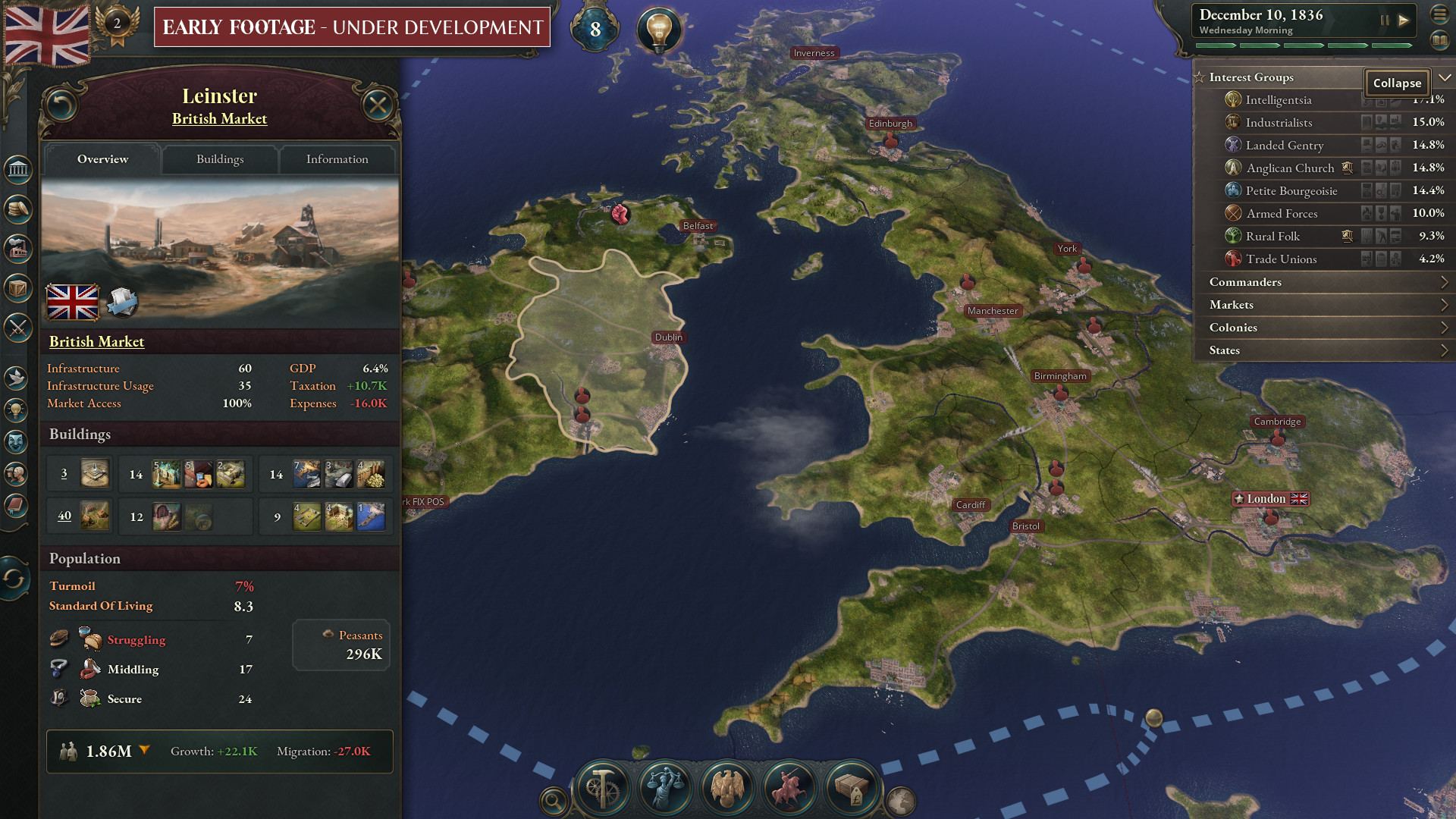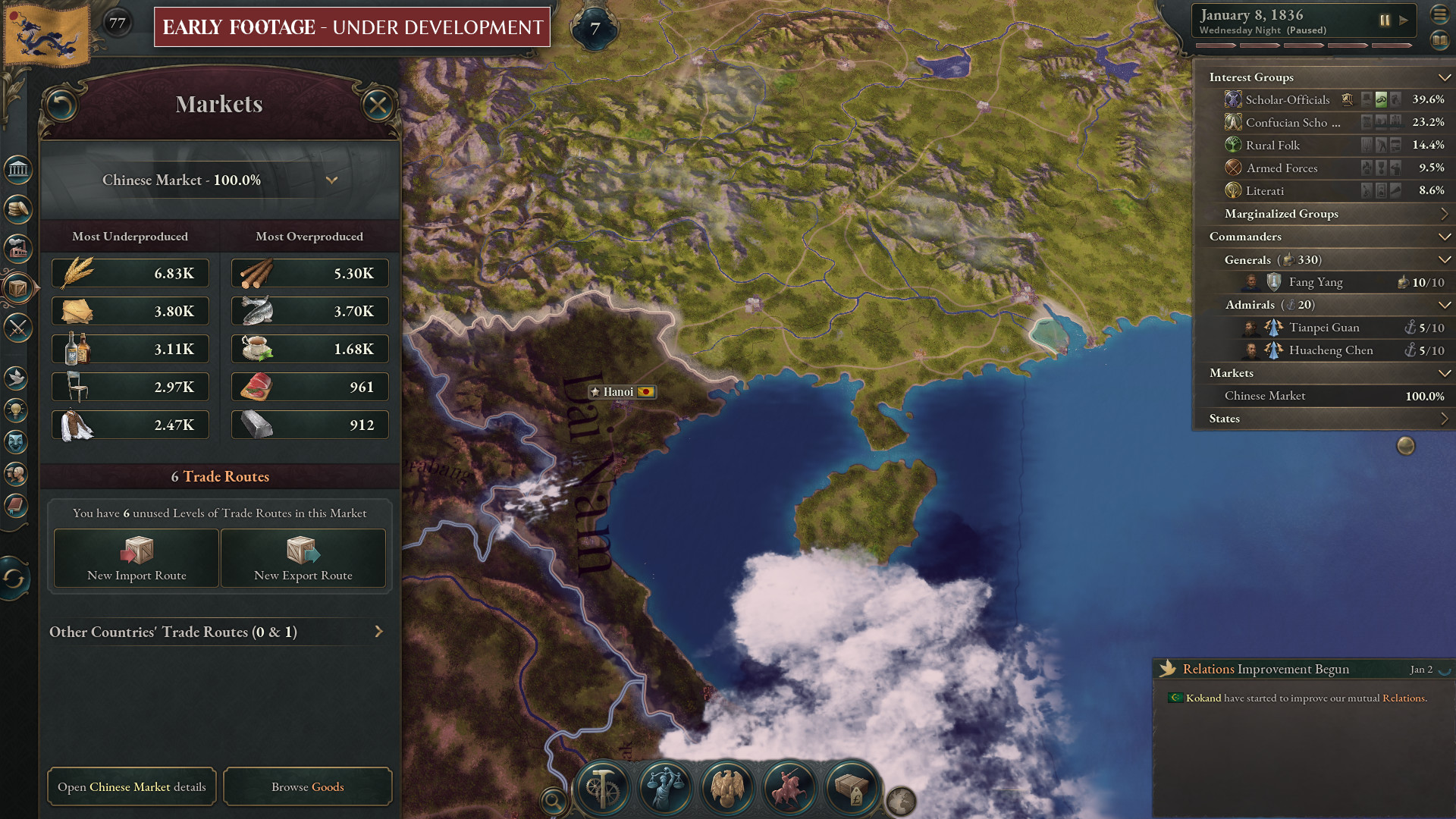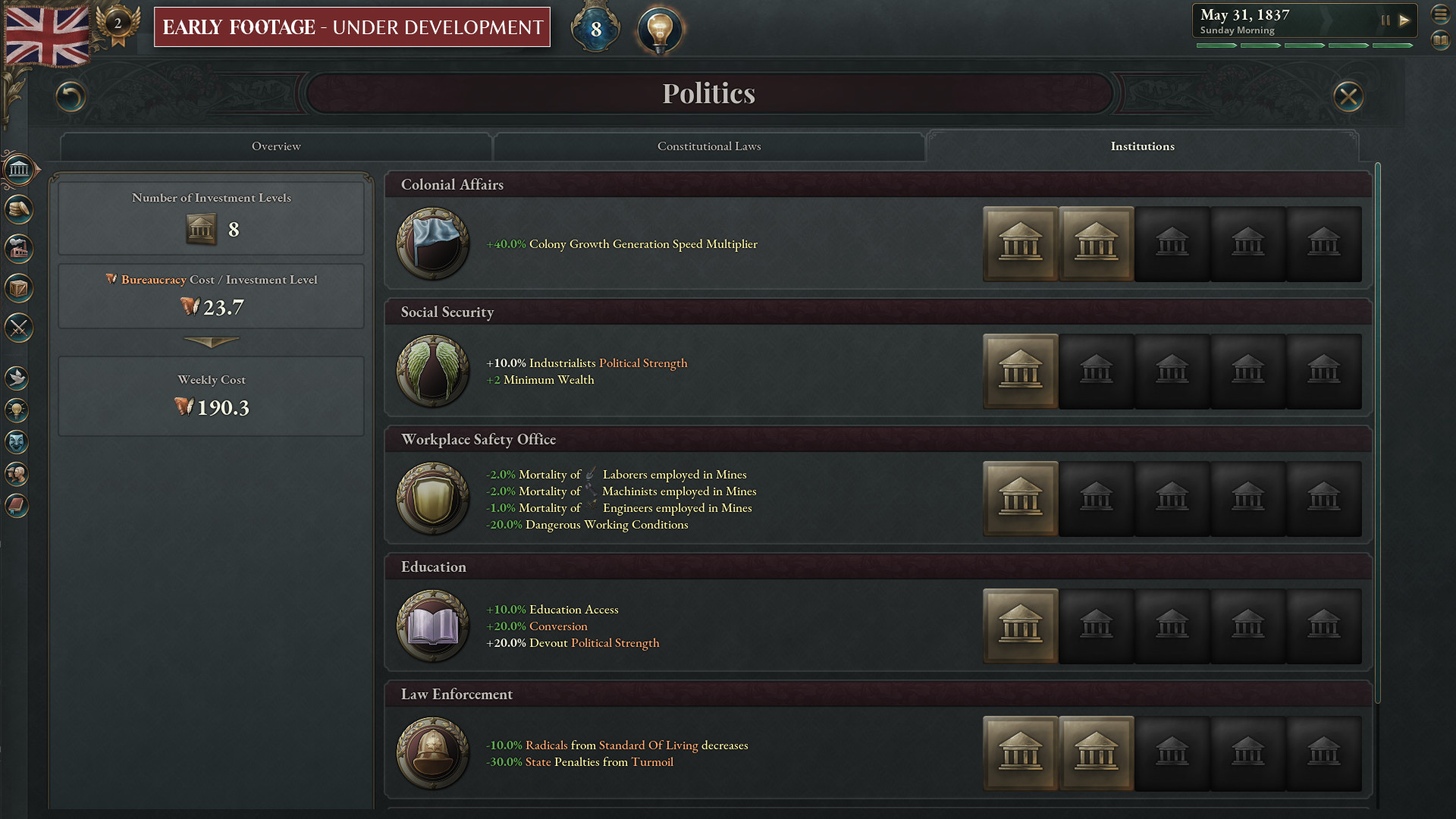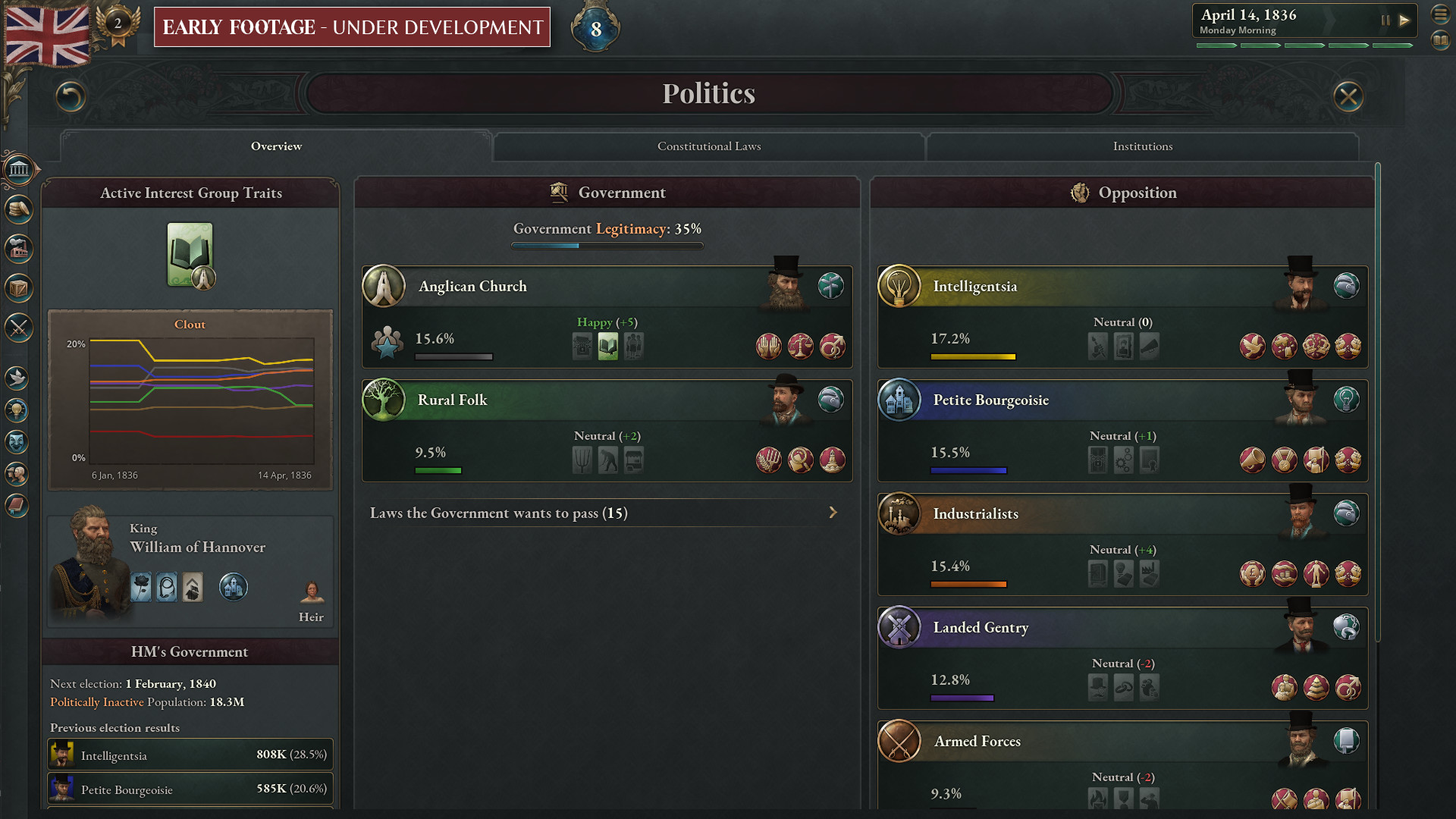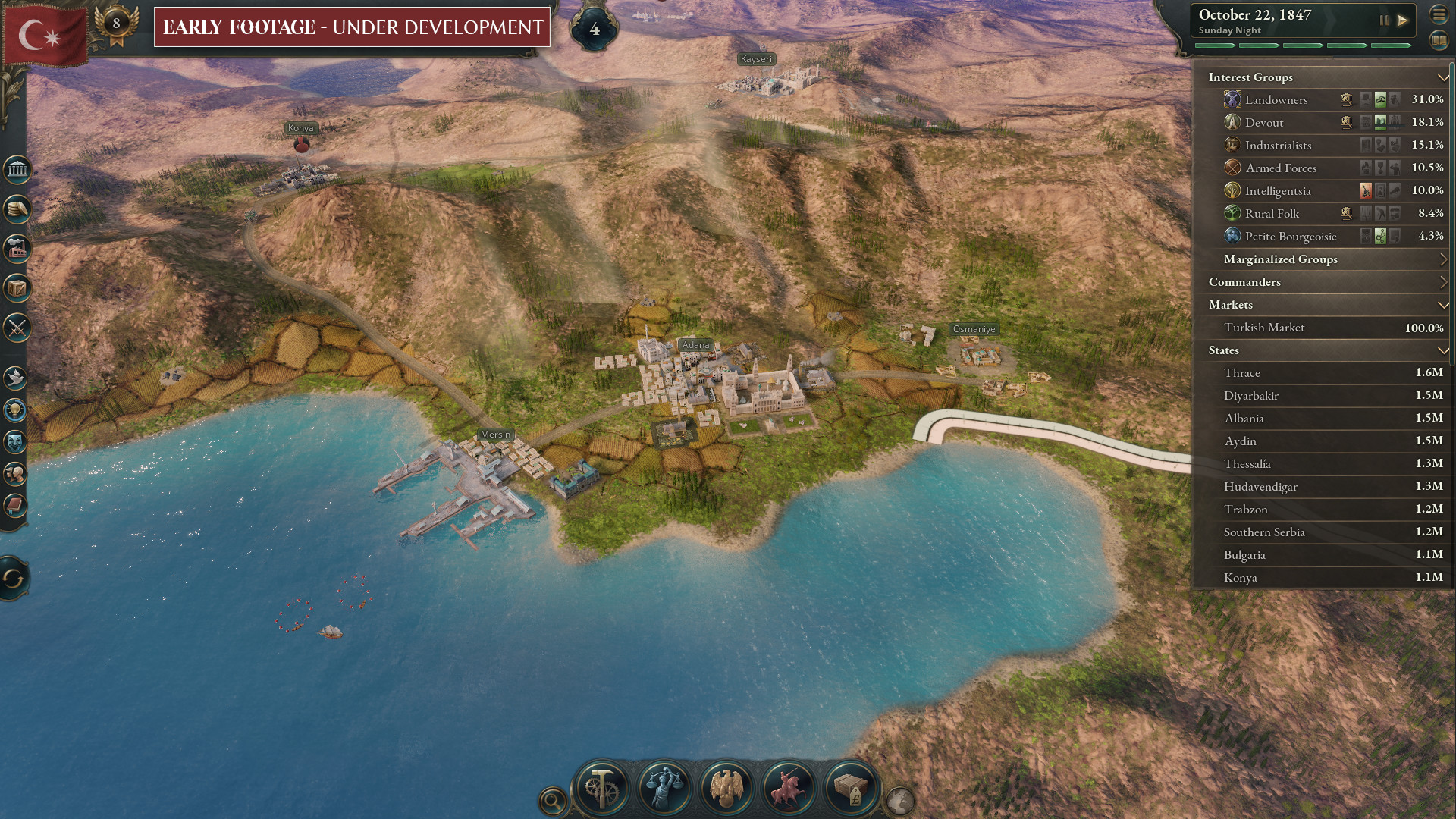SHAPE A GRAND TOMORROW
Paradox Development Studio invites you to build your ideal society in the tumult of the exciting and transformative 19th century. Balance the competing interests in your society and earn your place in the sun in Victoria 3, one of the most anticipated games in Paradox’s history.THE ULTIMATE SOCIETY SIMULATOR
- Lead dozens of world nations from 1836-1936. Agrarian or Industrial, Traditional or Radical, Peaceful or Expansionist... the choice is yours.
- Detailed population groups with their own economic needs and political desires.
- Reform your government and constitution to take advantage of new social innovations, or preserve the stability of your nation by holding fast to tradition in the face of revolutionaries.
- Research transformative new technology or ideas to improve your national situation.
DEEP ECONOMIC SYSTEM
- Expand your industry to take advantage of lucrative goods, taxing the profits to improve national prosperity.
- Import cheap raw materials to cover your basic needs while finding new markets for your finished goods.
- Secure vital goods to fuel your advanced economy and control the fate of empires.
- Balance employing available labor force with the needs for new types of workers.
PLAY ON A GRAND STAGE
- Use your diplomatic wiles to weave a tangled global web of pacts, relations, alliances, and rivalries to secure your diplomatic position on the world stage.
- Employ threats, military prowess and bluffs to persuade enemies to back down in conflicts.
- Increase your economic and military strength at the expense of rivals.
- Accumulate prestige and the respect of your rivals as you build an industrial giant at home or an empire abroad.

Its Thursday again and that means were going to continue talking about politics in games! Specifically, well be talking about Political Movements in Victoria 3. I touched a little bit on this feature back in Dev Diary #6 by saying that there are ways for politically disenfranchised Pops to push for reform, though that isnt the entirety of the role that Political Movements fill in the game.
What then are Political Movements? Put simply, a Political Movement is a way for your Pops to make a direct demand of the government, either because they desire change or because they dont desire the change you are currently pushing through. A Political Movement is always aimed at one particular law, and can take three different forms:
Movement to Preserve: This is a political movement that can form when there is sufficient opposition to the passing of a particular law. For example, if Great Britain starts replacing the Monarchy with a Republic, its very likely that this will result in a Movement to Preserve the Monarchy.
Movement to Enact: This is a political movement that can form when there is a popular demand for the enactment of a particular law. For example, if you have a politically active and literate but very poor underclass of laborers, these laborers might form a movement to create a minimum wage.
Movement to Restore: This is a political movement that works exactly like a Movement to Enact, but aims specifically to bring back a law that was previously in effect in the country - for example a Movement to restore the Monarchy in a Britain that successfully transitioned into a Republic. The main difference between a Movement to Restore and a Movement to Enact is that the former will tend to get some extra support from being able to harken back to the golden era of the past instead of having to champion new ideas.
Political Movements have a singular goal and will exist only so long as this goal remains unfulfilled. Their impact on the country in pushing for said goal is determined by their Support score. A Political Movement can have support from both Interest Groups (which represents a part of the political establishment backing the movement) and individual Pops (which represents individuals championing the movement in the streets).
Political Movements are not always progressive - while the Industrialists and Intelligentsia want to expand the franchise in Prussia, a coalition of more conservative Interest Groups are simultaneously pushing for more censorship
Interest Groups will provide Support for the Movement based on their Clout, while Pops provide Support based on raw numbers (compared to population as a whole), meaning that a single discriminated Laborer backing a Movement provides just as much Support as a fully enfranchised Aristocrat when taking action outside their Interest Group.
In other words, while Political Strength still plays an important role in Political Movements (in the form of Interest Groups throwing their Clout behind movements championing laws they like), it is entirely possible for a Political Movement to form with no Interest Group backing at all - even if nobody is willing to champion workers rights in the halls of power, enough angry workers in the streets may just be enough to affect change anyway.
Which Interest Groups will or will not back a Political Movement depends on whether they would approve of a change to the new law (in case of Enact/Restore) or disapprove of the current change in progress (in case of Preserve). Interest Groups that have high approval or who are part of the Government will not support Political Movements, though Government IGs may put pressure on you in other ways if theyre not pleased with your actions.
Pops are more complex, as they can back a Political Movement either because it aligns with their political movement (ie their preferred Interest Group is in favor of the movement) or because they have something to gain directly from it (for example a discriminated Pop backing a movement that would give them more rights).
This Political Movement to abolish the regressive Poll Tax is currently only backed by the Trade Unions and Pops sympathetic to them.
The Support score of a Political Movement has two direct effects on legislation: Firstly, it affects the chance of successfully passing a law (making it easier to pass the law the movement wants in the case of a Movement to Enact/Restore, and more difficult to replace in the case of a Movement to Preserve). Having a Movement to Enact/Restore also allows a country to attempt to pass the law the movement wants, even if said law has no backing among the Interest Groups in government.
But what then, if you dont intend to bow to the wishes of a movement in your country? This is where the Radicalism of a Political Movement comes in. Radicalism is based on the number of Radical pops and Clout of Angry Interest Groups supporting the Movement. A movement with low Radicalism is one that is intent on getting its wishes heard through peaceful means, while a movement with high Radicalism is willing to use more extreme methods, up to and including sparking a Revolution (though that particular topic is something well cover in a later dev diary).
Replacing the Monarchy with a Republic is *not* a popular idea in Sweden in 1836 - the opposition is both strong and highly radicalized - a civil war is all but guaranteed unless the government reverses course.
It is by no means a sure thing that every peaceful movement will become radical, and movements may very well fizzle out without accomplishing their goal, but ignoring the wishes of a significant part of your population and/or political establishment does come with some associated risks.
When talking about Political Movement Radicalism, I mentioned Radical Pops, and since they play an important role in creating and radicalizing Political Movements I thought Id take a little time to explain how Radical Pops and their Loyalist counterparts function in Victoria 3. The first thing that should be understood about Radicals and Loyalists is that just like with Interest Group membership, Radicals and Loyalists are not whole Pops but rather individuals within Pops.
Starting a game as France by hiking the taxes up as high as possible and slashing government/military salaries is a sure-fire way to watch the number of Radicals quickly climb
Radicals are individuals who have become disillusioned with the government and political apparatus of the country and want to seek change through any means necessary, while Loyalists are patriots who are generally willing to put their political views and goals aside for the sake of the nation. There is a large variety of ways that Pops can become Radicals or Loyalists, heres a few of the more common reasons listed below:
- Pops that experience an increase in material living standards will become more loyal
- Pops that experience a decrease in material living standards will become more radical
- Pops whose Standard of Living is below the minimum they expect to have will radicalize over time, particularly if its so low that theyre actually starving
- Pops that are literate but discriminated against tend to radicalize over time
- Pops from Political Movements whose demands are ignored may radicalize over time
- Pops from Political Movements that have their demands fulfilled become more loyal
Radicals and Loyalists generally function in directly opposite ways. For example, Radicals are more likely to create and join Political Movements (as well as contributing to radicalizing said movements) while Loyalists will never join Political Movements. Loyalists make the Interest Groups they are part of happier, while Radicals make them less happy and so on. This means that one way to prevent political activism and curtail movements that oppose your agenda is to increase the Standard of Living of your Pops. Just because you at some point during the game created prosperity (and as a result a bunch of Loyalists) doesnt mean everyone will just be onboard with your programme forever, though.
Pops will remain Radical or Loyalist until they either die or have a status change as a result of becoming more radical/loyal (for example, a Loyalist Pop might stop being Loyalist if their material standard of living suddenly takes a nosedive), but they do, in fact, die. As generations die off and are replaced by new ones, less and less people will remember all the great things you did for the country 30 years ago and will start wondering instead what youve done for them lately.
With that said, thats a wrap for this dev diary. Next week well continue talking about Politics on a topic that very much relates to Political Movements by being one of the most monumental political questions of the 19th century: Slavery.
Minimum Setup
- OS: TBC
- Processor: TBC
- Graphics: TBCSound Card: TBC
Recommended Setup
- OS: TBC
- Processor: TBC
- Graphics: TBCSound Card: TBC
[ 6374 ]
[ 5785 ]
[ 751 ]
[ 2194 ]

